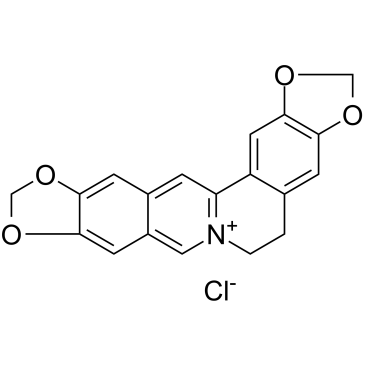Pseudocoptisine chloride |
| Catalog No.GC61566 |
El cloruro de pseudocoptisina (isocoptisina) es un alcaloide cuaternario con esqueleto de bencilisoquinolina, fue aislado de Corydalis Tuber.
Products are for research use only. Not for human use. We do not sell to patients.

Cas No.: 30044-78-1
Sample solution is provided at 25 µL, 10mM.
Pseudocoptisine (Isocoptisine) chloride is a quaternary alkaloid with benzylisoquinoline skeleton, was isolated from Corydalis Tuber. Pseudocoptisine chloride inhibits acetylcholinesterase (AChE) activity with an IC50 of 12.8 μM. Anti-inflammatory and anti-amnestic effects[1][2].
Pseudocoptisine (0, 60, 90 μM; 1 hour) dose-dependently inhibited LPS-induced NO production in RAW264.7 cells[2].Pseudocoptisine (30-90 μM; 1 hour; RAW264.7 cells) significantly reduces the LPS-induced TNF-α and IL-6 production and their mRNA expressions[1].Pseudocoptisine acetate reduces levels of the pro-inflammatory mediators, such as, iNOS, COX-2, TNF-alpha, and IL-6 through the inhibition of NF-kappaB activation via the suppression of ERK and p38 phosphorylation in RAW 264.7 cells[1].
The anti-amnesic activities of Pseudocoptisine in mice on the learning and memory impairments induced by scopolamine (1.0 mg/kg, i.p.) are examined. Pseudocoptisine (2.0 mg/kg, p.o.) significantly reverses cognitive impairments in mice by passive avoidance test[1].
[1]. Hung TM, et al. Anti-amnestic activity of pseudocoptisine from Corydalis Tuber. Biol Pharm Bull. 2008;31(1):159-162. [2]. Yun KJ, et al. Quaternary alkaloid, pseudocoptisine isolated from tubers of Corydalis turtschaninovi inhibits LPS-induced nitric oxide, PGE(2), and pro-inflammatory cytokines production via the down-regulation of NF-kappaB in RAW 264.7 murine macrophage cells. Int Immunopharmacol. 2009;9(11):1323-1331.
Average Rating: 5 (Based on Reviews and 4 reference(s) in Google Scholar.)
GLPBIO products are for RESEARCH USE ONLY. Please make sure your review or question is research based.
Required fields are marked with *




















